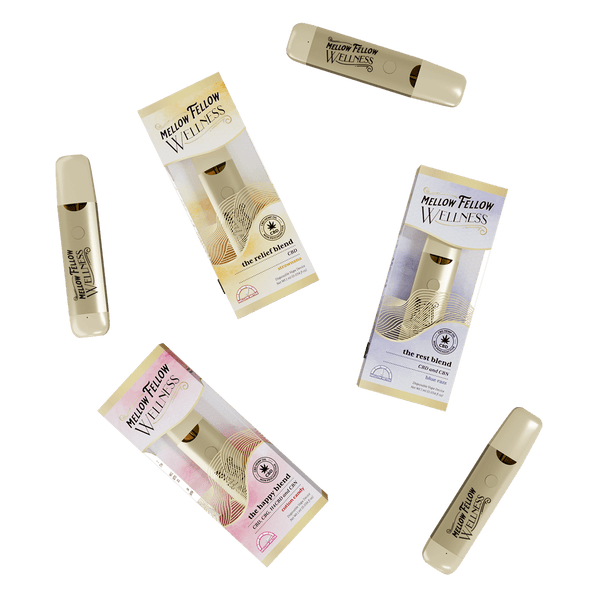Can CBD Help You Quit Nicotine?

Giving up nicotine can feel like climbing a steep hill. Withdrawal symptoms often make quitting nicotine a tough challenge. Cravings, irritability, and stress can quickly sidetrack even those with the strongest willpower.
Because nicotine addiction is considered one of the toughest to overcome, many search for alternatives to aid in quitting, with CBD coming to the forefront.
CBD, short for cannabidiol, works with your body’s endocannabinoid system, which influences mood, stress, and cravings, with early research suggesting it might help reduce withdrawal symptoms and manage triggers.
If you're thinking about quitting nicotine, getting a handle on addiction science and how CBD might play into your strategy is a good starting point.
So, can CBD help with nicotine withdrawal symptoms? Keep reading to find out! Let’s start by examining what a nicotine addiction is and what it does to your body.
Key Takeaways
-
Nicotine addiction is driven by dopamine release, reinforcing cravings and making quitting difficult.
-
Withdrawal symptoms include mood swings, irritability, fatigue, and difficulty concentrating, which contribute to relapse.
-
CBD may help regulate dopamine levels, reducing cravings without reinforcing addiction.
-
CBD interacts with serotonin receptors, potentially stabilizing mood and lowering anxiety associated with nicotine withdrawal.
-
Different CBD products serve unique purposes—vapes for immediate cravings, tinctures for daily balance, and edibles for long-lasting effects.
-
Combining CBD with behavioral strategies and a support system increases the chances of successfully quitting nicotine.
Understanding Nicotine Addiction and Withdrawal
Nicotine addiction works by stimulating nicotinic acetylcholine receptors in the brain, triggering the release of dopamine, the neurotransmitter responsible for pleasure and reward.
Over time, the brain begins to depend on nicotine to maintain these elevated dopamine levels, reinforcing the cycle of addiction. Another key player, glutamate, enhances memory formation, further cementing the habit.
When nicotine intake stops, these receptors go into a state of deprivation, leading to the uncomfortable experience known as withdrawal. Let’s discuss the physical and emotional impacts of nicotine withdrawal.
Physical and Emotional Impact of Nicotine Withdrawal
Nicotine withdrawal affects both the body and mind, often making the quitting process challenging.
Physical symptoms can include headaches, fatigue, insomnia, increased appetite, and digestive issues, while the psychological effects often manifest as irritability, mood swings, anxiety, depression, and difficulty concentrating. These combined factors can make quitting feel overwhelming.
Statistics show that only 4% to 7% of people successfully quit smoking without assistance. At the same time, those who use support systems, such as behavioral therapy, nicotine replacement therapy, or prescription medications, have a much higher success rate.
According to the World Health Organization, seeking professional assistance can increase the chances of success by up to 84%. The bottom line is that according to the CDC, only one in ten adults successfully quit smoking and nicotine each year, illustrating just how difficult it is to do so.
This highlights the importance of a structured quitting strategy rather than relying on sheer willpower alone. With such abysmal numbers, those looking to quit nicotine must rely on all possible alternatives, with CBD being one of them, as we will discuss further below.
Before we talk about CBD and quitting nicotine, let’s discuss the role of habit and routine in nicotine addiction.
The Role of Habit and Routine in Addiction
Nicotine dependence isn’t just a physical addiction, as it’s deeply tied to habit and routine. Many smokers develop strong psychological associations between smoking and daily activities, making certain situations powerful triggers for cravings.
Common triggers include morning coffee, work breaks, social gatherings, or stressful situations. Over time, smoking becomes more than just a source of nicotine, as it turns into a ritual for relaxation, focus, or reward. These behavioral patterns can be difficult to break, as they are deeply ingrained in daily life.
Successfully quitting requires not only managing withdrawal symptoms but also replacing smoking-related habits with healthier alternatives. Strategies like mindfulness, exercise, or behavioral therapy can help rewire these associations, making it easier to break free from both the physical and psychological grip of nicotine addiction.
That said, let’s find out how CBD may help with nicotine addiction.
How CBD Helps with Nicotine Addiction: Research-Backed Benefits of CBD for Smoking Cessation
Smoking hijacks the brain’s reward system by increasing dopamine levels, reinforcing cravings and habitual use. Quitting leads to withdrawal symptoms such as irritability, anxiety, and difficulty concentrating, making relapse common.
However, CBD (cannabidiol) has become a popular aid in managing nicotine addiction by targeting multiple pathways, including the endocannabinoid system, dopamine regulation, serotonin balance, and behavioral reinforcement, among other factors.
Let’s discuss how CBD can support those trying to quit nicotine.
CBD's Impact on Nicotine Cravings
Nicotine cravings arise due to a variety of issues, including dopamine and serotonin regulation, as well as behavioral reinforcement. Well, CBD may help control nicotine cravings on all fronts through the following means.
CBD Helps Regulate Dopamine Levels
Nicotine binds to nicotinic acetylcholine receptors (nAChRs) in the brain, triggering the release of dopamine, the neurotransmitter responsible for pleasure and reward. This dopamine release leads to a temporary feeling of relaxation and satisfaction, reinforcing the desire to smoke.
Since nicotine addiction is largely driven by dopamine surges, quitting leads to withdrawal symptoms caused by dopamine depletion.
CBD doesn’t cause a dopamine spike like nicotine does, but it modulates dopamine release gradually, helping the brain return to normal dopamine function. This reduces cravings and helps stabilize mood.
CBD interacts with CB1 receptors in the brain, influencing dopamine release to promote balance rather than intense highs and lows. Since CBD has the potential to modulate dopamine production, it may effectively replace the dopamine now missing due to the lack of nicotine.
CBD may also protect dopamine-producing neurons from damage, which is essential in reversing long-term addiction-related changes in the brain.
CBD may also help reduce nicotine cravings by affecting behavioral triggers.
CBD Reduces Cravings by Weakening Behavioral Triggers
Nicotine also stimulates glutamate, a neurotransmitter associated with learning and memory. This strengthens the connection between smoking and daily routines, making certain situations, such as drinking coffee or taking a break, trigger cravings.
Since nicotine addiction is partly behavioral, CBD can potentially help retrain the brain through the following means:
-
Reducing “Cue-Induced Cravings”: CBD may reduce the brain’s response to smoking triggers, making habitual cravings less intense.
-
Altering Reward Processing: CBD can change the way the brain perceives nicotine rewards, reducing the urge to reach for a cigarette in familiar situations.
-
Breaking the Stress-Smoking Cycle: Since smoking is often used as a coping mechanism for stress, CBD offers a non-addictive alternative that promotes relaxation.
On an interesting note, a study performed on a group of participants quitting cigarettes showed a 40% decrease in cigarettes smoked when CBD was involved.
However, CBD doesn’t just have the potential to reduce nicotine cravings, but also to reduce the withdrawal symptoms associated with nicotine cessation.
CBD’s Impact on Nicotine Withdrawal Symptoms
By impacting serotonin levels, sleep, and even physical withdrawal symptoms, CBD can make quitting nicotine much easier. Here’s how CBD may reduce nicotine withdrawal symptoms:
CBD Supports Serotonin Balance for Mood and Stress
Over time, nicotine disrupts serotonin levels, the neurotransmitter responsible for regulating mood, anxiety, and impulse control. When you quit smoking, serotonin drops, leading to increased irritability, anxiety, and depression.
CBD interacts with serotonin (5-HT1A) receptors, helping to restore serotonin levels that drop when nicotine use stops. This can alleviate common withdrawal symptoms such as:
-
Irritability and Mood Swings: Low serotonin contributes to anxiety and depression after quitting nicotine. CBD can help maintain stable serotonin levels and improve mood.
-
Anxiety and Stress Reduction: Quitting smoking increases cortisol (stress hormone) levels. CBD potentially lowers cortisol and increases serotonin, promoting calmness.
-
Impulse Control: Nicotine cravings are partly driven by low serotonin levels, which increase impulsivity. By stabilizing serotonin, CBD can help resist urges to smoke.
CBD Helps with Sleep Disruptions
Many people experience insomnia or restless sleep when quitting nicotine. CBD can promote better sleep by:
-
Regulating Circadian Rhythms: CBD interacts with receptors in the brain that control sleep-wake cycles.
-
Reducing Nighttime Restlessness: CBD’s calming effects can help counteract the jittery sensation common during withdrawal.
-
Promoting Deep Sleep: Research suggests that CBD may improve REM sleep quality, reducing the likelihood of waking up during the night.
CBD Can Ease Physical Withdrawal Symptoms
Quitting nicotine affects not only the brain but also the body. Common withdrawal symptoms include headaches, nausea, muscle tension, digestive issues, and increased appetite. CBD has possible anti-inflammatory and gastrointestinal benefits that can help:
-
Reduce headaches and muscle tension by relaxing tight muscles and improving blood flow.
-
Soothe digestive discomfort by interacting with gut receptors to reduce nausea and bloating.
-
Regulate appetite by potentially balancing hunger hormones.
Now that we know how CBD can help you quit nicotine, let’s talk about safety.
Safety and Efficacy
Most users tolerate CBD well, though some may experience mild side effects like dry mouth, drowsiness, or appetite changes.
Studies show it lacks addictive properties, making it a safe option for managing symptoms associated with quitting smoking. It's wise to choose products that third-party labs have tested to maintain quality and consistency.
Let’s move on and help you choose the right CBD products for quitting nicotine.
Creating Your CBD-Based Quit Plan
CBD can undoubtedly help make quitting nicotine easier. However, you still need to follow the proper steps, including identifying your triggers and choosing the right CBD products (something we’ll discuss later below).

Here’s how to create a CBD-based nicotine quit plan:
Identify Your Triggers
Make a list of specific situations or emotions that prompt you to reach for nicotine; this awareness helps you prepare for those moments.
Choose Your CBD Products
Decide on products based on how you plan to handle symptoms. For quick relief, keep disposable CBD vapes or gummies nearby; softgel capsules or other long-lasting options can provide all-day support.
Set a Schedule
Organize your CBD use throughout the day. You might start with a softgel in the morning, take a vape during peak cravings, and have gummies before bedtime to aid sleep.
Dosage Guidelines
Begin with the lowest effective dose and adjust gradually based on your needs and the product. Pay attention to how you feel after each use, noting any changes in cravings or withdrawal symptoms. If you’re using vapes, try just one or two puffs at a time and see how it affects you, and then go from there.
If we are talking about any form of edible, whether a gummy, chocolate, capsule, or tincture, aim for a starting dose of 10 to 20mg, starting with three daily doses.
However, this is, of course, all very subjective, as CBD will affect people differently based on various factors such as size, metabolism, tolerance, and the level of nicotine addiction. Some may require a much higher dose to achieve the desired effects.
Let’s now help you find some of the best CBD products for quitting nicotine.
Choosing the Right CBD Products for Quitting Nicotine
Choosing the right CBD products for quitting nicotine depends on your needs and preferences. Some possible options include CBD vapes, capsules, tinctures, and edibles.
Moreover, the right formulations and cannabinoid combinations can also make a difference. Whether you need something to help you focus, reduce cravings, or manage withdrawal symptoms, we have something for everyone.
Let’s choose the best CBD products for quitting nicotine.
CBD Products for Focus and Irritability
If you’re having trouble with focus and irritability, then the following capsules and gummies might be best for you.
Wellness Gummies - Illuminate: The Focus Blend - 600mg
These CBD and THCv-infused gummies are designed to promote mental clarity, energy, and focus while offering a calming effect.
THCv, a cannabinoid known for its stimulating and cognitive-enhancing properties, works alongside CBD, which helps regulate stress and promote balance. The tropical medley flavor makes them an enjoyable and convenient way to support productivity.
For individuals experiencing nicotine withdrawal, these gummies may help alleviate irritability by regulating dopamine levels. CBD’s interaction with the endocannabinoid system (ECS) helps reduce stress and anxiety, which are common when quitting nicotine.
Furthermore, THCv's potential to promote focus without jitteriness makes it ideal for managing brain fog and concentration issues that often arise in the early stages of withdrawal. Since gummies provide a slow release, their effects can be long-lasting, making them a great option for steady relief throughout the day.
Wellness Softgel Capsules - Illuminate: The Focus Blend - 600mg
These CBD and THCv softgel capsules offer the same powerful blend as the gummies but in a convenient, flavorless format. Each capsule contains 20mg of cannabinoids, formulated to provide a sustained sense of focus, clarity, and relaxation.
Unlike the gummies, which slowly dissolve in the digestive system, the softgels offer a controlled release that ensures steady absorption, making them a reliable option for extended support.
Related Products
For those struggling with nicotine cravings and withdrawal symptoms, these capsules may help regulate dopamine and serotonin levels, reducing mood swings and irritability. CBD’s ability to interact with serotonin receptors plays a crucial role in stabilizing emotions, while THCv can help combat fatigue and enhance cognitive function.
This makes the softgels particularly useful for individuals who experience stress-related cravings or difficulty concentrating after quitting nicotine. Because they offer consistent dosing and a gradual effect, they can be especially beneficial for long-term support and reducing impulsive urges to smoke or vape.
CBD Products to Combat Fatigue and Replace Nicotine’s Stimulating Effects
Let’s now take a look at some of the best CBD products to help stimulate you a little bit, this replacing the stimulating effects of nicotine.
Wellness Gummies - Momentum: The Energy Blend - Tropic Medley - 1500mg
These Momentum Energy Blend CBD gummies are formulated with CBD, CBG, THCv, and CBC, designed to provide sustained energy and mental clarity throughout the day. The blend of cannabinoids works synergistically to create a natural boost without the jitters associated with nicotine or caffeine.
THCv is known for its stimulating and appetite-regulating properties, while CBG and CBC support cognitive function and neuroprotection. Combined with CBD, this formula helps balance energy levels while promoting focus and stress relief.
The Tropic Medley flavor adds a refreshing touch, making these gummies a tasty and convenient option for replacing nicotine. Since fatigue is a common withdrawal symptom, these gummies may help provide a steady stream of focus and alertness without crashes.
Wellness Tincture - Momentum: The Energy Blend - Berry - 1500mg
This Momentum Energy Blend Tincture combines CBD, CBG, CBC, and THCv with limonene, a citrus-derived terpene known for its uplifting and mood-enhancing effects. Designed for those needing a quick and effective way to regain focus and alertness, this tincture provides a fast-acting boost of energy that can help replace the stimulating effects of nicotine.
THCv is thought to play a key role in improving concentration and mental endurance, while CBG and CBC may contribute to neuroprotection and overall brain function. CBD works to maintain balance, possibly reducing stress and anxiety that can arise when quitting nicotine.
The Berry flavor makes this tincture enjoyable to take, whether placed under the tongue for rapid absorption or added to a beverage. The combination of cannabinoids and terpenes creates a smooth, non-jittery energy boost, making it an excellent choice for those experiencing withdrawal fatigue.
CBD Products to Fight Low Mood
Seeing as quitting nicotine can sap your mood, let’s take a look at some of the best CBD products to fight off that bad mood.
The Happy Blend - 1ml CBD Disposable Vape (Cotton Candy)
This disposable CBD vape blends CBD, CBG, H4CBD, and CBN, creating a well-balanced formula designed to elevate mood and encourage relaxation. The cotton candy flavor adds a sweet and enjoyable touch, making each puff a pleasant experience.
CBG supports cognitive function, while CBN enhances relaxation, making this vape ideal for easing irritability and mood swings associated with nicotine withdrawal. The fast-acting effects make it a great option for on-the-go relief, helping to replace the habitual hand-to-mouth motion of smoking while promoting a sense of calm.
Wellness Tincture - Elevate: The Happy Blend - Mint - 2000mg
This full-spectrum CBD tincture combines CBD, CBG, CBC, and CBDv with myrcene, an uplifting terpene known for its calming effects. The mint flavor provides a refreshing touch, making it an easy addition to any wellness routine.
The combination of cannabinoids works to balance mood and reduce the emotional distress often triggered by nicotine withdrawal.
CBD helps regulate serotonin levels, while CBC and CBG work together to promote relaxation and cognitive clarity. This tincture is ideal for daily use to maintain emotional stability and ease tension throughout the quitting process.
Wellness Gummies - Elevate: The Happy Blend - Tropic Medley - 2000mg
These full-spectrum CBD gummies feature CBD, CBG, CBC, and CBDv, delivering a multi-faceted approach to mood support. Each gummy contains 68mg of cannabinoids, offering potential long-lasting relief from stress, irritability, and emotional fluctuations linked to nicotine withdrawal.
CBDv plays a role in neuroprotection and mental clarity, while CBC and CBG enhance relaxation without sedation. The tropical medley flavor makes them an enjoyable and convenient way to stabilize mood and maintain emotional balance throughout the day, making the quitting process smoother and more manageable.
Success Tips and Best Practices
Here are some valuable dos and don'ts to make the most of CBD to help you kick the nicotine.
Dos:
-
Use CBD at the same time each day to create a routine.
-
Combine CBD use with stress-relieving activities such as yoga, deep breathing, or walking.
-
Keep CBD products handy during peak craving times, like after meals or during breaks.
-
Stay hydrated and maintain a balanced diet to support your overall wellness.
-
Track how each CBD product affects your cravings and mood.
Don'ts:
-
Avoid taking more than the recommended dosages without checking how your body responds.
-
Don't rely solely on CBD without addressing other habits linked to smoking.
-
Avoid using CBD products sporadically or inconsistently, as this can reduce their effectiveness.
-
Don’t skip meals or lose sleep, as physical stress can make withdrawal symptoms worse.
-
Stay away from triggers like alcohol or places associated with smoking until you feel more in control.
For the best chances of success, something else you should be doing is tracking your progress.
Tracking Progress
Keeping an eye on your quitting journey helps you determine what works and doesn’t. Maintain a simple log to note how you feel, how often you crave, and how effective CBD has managed those moments.
Based on these observations, adjust your CBD products or dosage to find what works best for you.
Here’s how to track your progress:
-
Weekly Goals: Write down specific goals, like reducing cigarette use or improving sleep quality.
-
Symptom Tracking: Record physical and emotional symptoms daily, including cravings, mood changes, and energy levels.
-
Product Effectiveness Notes: Note which CBD products worked best for particular symptoms, like anxiety or restlessness, and how long the effects lasted.
Expert Recommendations and Support
Knowing when to use each type of product is important for the best chances of success, and knowing when to seek help matters, too.
When to Use Each Product
CBD products can be highly effective in managing nicotine withdrawal, but choosing the right form depends on when and how you need support.
CBD Vapes
CBD vapes are ideal for quick relief from sudden cravings. Since inhalation delivers CBD rapidly into the bloodstream, taking a quick puff during moments of stress or strong nicotine urges can help ease cravings within minutes. This makes vapes a great option for those who need fast-acting effects throughout the day.
CBD Tinctures
CBD tinctures balance fast absorption and long-lasting effects, making them a great choice for morning and midday use.
Taking a few drops under the tongue allows CBD to take effect within 15 to 30 minutes, helping regulate mood, reduce cravings, and keep withdrawal symptoms in check throughout the day. This method works well for those looking for sustained relief without frequently re-dosing.
CDB Edibles
For nighttime cravings, stress, and sleep disturbances, CBD edibles or gummies are the best option. They take longer to kick in, usually one to two hours, but provide extended effects that can last up to eight hours. This makes them particularly useful for preventing late-night cigarette cravings and improving sleep quality, which can often be disrupted when quitting nicotine.
CBD Capsules
CBD capsules provide a discreet and precise way to incorporate CBD into a daily routine. Since they release CBD gradually, it works well for those who want a steady, controlled dosage throughout the day.
Taking a capsule in the morning and another in the afternoon can help maintain a stable level of CBD in the system, reducing the overall urge to smoke and promoting long-term withdrawal success.
Taking the right forms of CBD at the right times is half the battle, but building an adequate support system is also important.
Building a Support System to Quit Nicotine
Building a strong support system can make quitting nicotine much easier. Surrounding yourself with the right people, tools, and strategies can help keep you accountable and motivated.
Online forums, social media groups, and local support communities offer a space to share experiences, gain encouragement, and learn effective strategies from others on the same path.
Professional guidance can also be invaluable. Working with a healthcare provider or smoking cessation counselor can provide personalized strategies and expert advice tailored to your specific needs.
Beyond personal connections, technology offers additional support. Apps and helplines designed for smoking cessation can track progress, send motivational reminders, and provide real-time encouragement during difficult moments.
Conclusion: Can CBD Help with Nicotine Withdrawal Symptoms?
Quitting nicotine is a challenging journey, often marked by intense cravings, mood swings, and difficulty focusing. Traditional quitting methods, such as nicotine replacement therapy and behavioral interventions, have varying success rates, leading many to seek alternative solutions.
CBD has become a promising tool in nicotine cessation, with research suggesting it may help regulate dopamine levels, reduce cravings, and alleviate withdrawal symptoms.
Whether in the form of vapes for quick relief, tinctures for steady support, or edibles for long-lasting effects, CBD offers a versatile approach to managing nicotine withdrawal.
While CBD alone may not be a magic cure, incorporating it into a well-structured quit plan alongside behavioral adjustments and a strong support system can significantly improve the chances of long-term success.
To help you quit nicotine, explore the CBD products available at Mellow Fellow.
Frequently Asked Questions
Can CBD Help With Nicotine Withdrawal Symptoms?
Yes, CBD may help alleviate nicotine withdrawal symptoms by regulating dopamine and serotonin levels, which play a role in mood stability and impulse control. It may also reduce stress, anxiety, and physical withdrawal effects such as headaches and sleep disturbances, making it easier to quit.
Which CBD Gummies Help Quit Smoking?
CBD gummies infused with THCv, CBG, and CBC, such as the Focus Blend or Energy Blend, are excellent options. These cannabinoids help support focus, cognitive function, and mood balance while reducing cravings and withdrawal symptoms.
Can CBD Help You Quit Smoking Tobacco?
CBD does not act as a direct nicotine replacement but may help manage withdrawal symptoms and reduce cravings. Studies suggest that CBD influences reward pathways in the brain, making it easier to break the habit and resist smoking triggers.
How Long Does It Take for CBD to Work for Nicotine Cravings?
CBD vapes can provide near-instant relief from cravings, while tinctures typically take 15 to 30 minutes. Edibles and capsules, which have longer-lasting effects, may take one to two hours to kick in but provide sustained support throughout the day.
Does CBD Help Reduce Nicotine-Related Anxiety?
Yes, CBD has potential anxiolytic (anxiety-reducing) properties by interacting with serotonin receptors. This may help alleviate stress and irritability, which are common during nicotine withdrawal.
Can CBD Replace the Stimulant Effect of Nicotine?
Certain cannabinoids, such as THCv and CBG, offer mild stimulating effects that may help combat nicotine withdrawal fatigue. Products containing these cannabinoids can provide a natural energy boost without the crash associated with nicotine.
Are There Any Risks in Using CBD to Quit Nicotine?
CBD is generally well-tolerated, but some individuals may experience mild side effects such as dry mouth, drowsiness, or changes in appetite. It’s essential to start with a low dose and monitor how your body responds. Consulting a healthcare provider before combining CBD with medications is also recommended.
Sources:
-
Smoking Cessation: Fast Facts | Smoking and Tobacco Use | CDC
-
Role of Cannabidiol in the Therapeutic Intervention for Substance Use Disorders - PMC
-
Frontiers | Cannabidiol and brain function: current knowledge and future perspectives
-
Enhancing Endocannabinoid Control of Stress with Cannabidiol - PMC
-
Cannabidiol affects circadian clock core complex and its regulation in microglia cells - PubMed
-
Antioxidative and Anti-Inflammatory Properties of Cannabidiol - PMC
-
Cannabidiol and Intestinal Motility: a Systematic Review - PMC
-
Cannabidiol reduces cigarette consumption in tobacco smokers: preliminary findings - PubMed
Disclaimer: The content provided on this blog is for informational and entertainment purposes only and is not intended as medical advice, diagnosis, or treatment. Always seek the advice of a qualified healthcare professional regarding any medical condition or treatment, including the use of CBD or other supplements. The information presented is based on general research and should not replace personalized guidance from a licensed medical provider. Use of this blog and its content is at your own risk. Mellow Fellow assumes no liability for decisions made based on the information provided.
Explore Other Articles
View allExplore more
- 11 hydroxy thc
- Blends
- blunt
- burn blend
- cannabinoids
- cartridge
- CBD
- cbg
- CBN
- Charged Blend
- Clarity Blend
- Concentrates
- Connection Blend
- Creativity Blend
- Dabs
- delta
- delta 10
- delta 11
- delta 8
- Delta 8 thc
- delta 9
- delta 9 thc
- Delta-10-THC
- Delta-11-THC
- delta-8
- Delta-8-THC
- Delta-9-THC
- delta9
- Desire Blend
- destination series
- Diamonds
- disposable
- disposable vape
- Dream Blend
- edibles
- elevate blend
- entourage
- entourage effect
- entourage effects
- Euphoria Blend
- focus
- gummies
- H4CBD
- halloween
- hemp
- hemp-derived
- HHC
- HHCp
- HTE
- Indica
- Introvert Blend
- lean
- legal
- Live Resin
- Live Resin cartridges
- m-fusions
- mechoulam
- momentum blend
- Motivation Blend
- preroll
- productivity
- raphael mechoulam
- Recover Blend
- Relief
- sleep
- strain review
- terp sauce
- Terpenes
- Thanksgiving
- thc
- THC Drink
- thc lean
- thc-p
- THCa
- THCb
- THCh
- THCm
- thcp
- THCp edibles
- THCv
- the elevate blend
- The Energy Blend
- The Happy Blend
- The Illuminate blend
- the momentum blend
- The Rest Blend
- Tranquility Blend
- vape
- vape cartridge
- Vapes
- wax
- wellness
- zkittlez


















Leave a comment